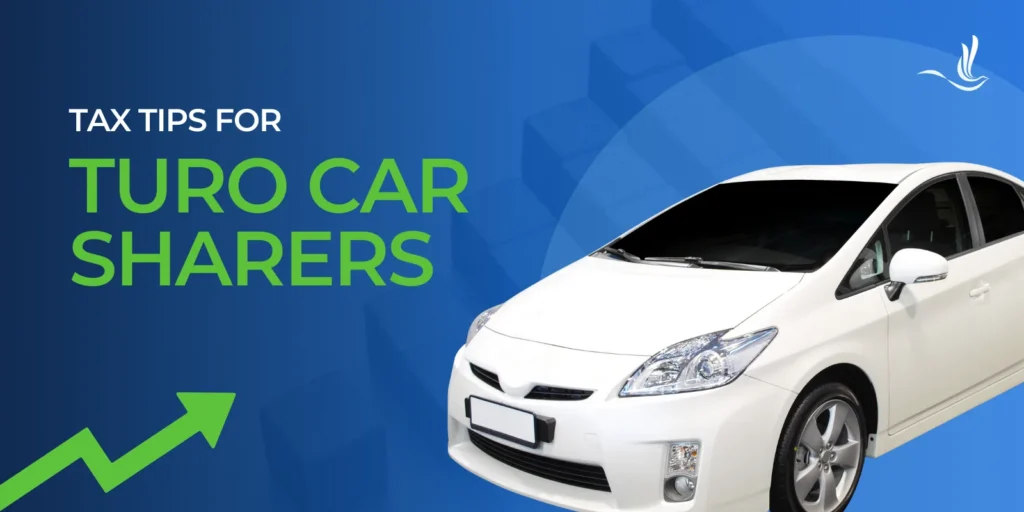
Renting out your car on Turo can be a great way to earn extra income, but it also comes with tax responsibilities. If you’re a Turo car sharer, understanding your tax obligations is essential to avoid surprises come tax season. Here are some important tax tips for Turo car sharers to keep in mind.
What is Turo?
Turo is a peer-to-peer car-sharing platform that allows individuals to rent out their personal vehicles to others. Often referred to as the “Airbnb for cars,” Turo enables car owners (hosts) to earn money by listing their vehicles on the platform and renting them out to other users (guests) who need a vehicle for a short period, such as for a day, a weekend, or longer.
Know What Income is Taxable
Any income you earn from renting your car on Turo is taxable and must be reported on your tax return. This includes the rental payments you receive from guests, as well as any additional fees, such as delivery charges or cleaning fees. You’ll need to report this income on your Schedule C if you’re operating as a sole proprietor, which is the most common structure for Turo hosts.
Understand the Turo Tax Forms
Turo will issue you a Form 1099-K, Payment Card and Third-Party Network Transactions, if your rental income exceeds certain thresholds. In tax year 2024, the threshold for IRS Form 1099-K is $5,000. However, beginning in 2025, this threshold will be just $600. Remember, even if you don’t receive a 1099 form, you’re still required to report all your income. You can access your 1099-K in your Turo account.
Keep Detailed Records
Good record-keeping is crucial for Turo car sharers. You should track all income and expenses related to your Turo activity. This includes maintenance costs, repairs, insurance, cleaning, and any other expenses incurred to keep your car rental-ready. Keeping detailed records will help you accurately report your income and claim all the deductions you’re entitled to.
Deduct Business Expenses
One of the benefits of renting your car on Turo is the ability to deduct business expenses. These can include:
- Depreciation: You can deduct the depreciation of your car’s value over time.
- Repairs and Maintenance: Any costs for repairs, oil changes, tire rotations, and other maintenance related to the rental use of your car are deductible.
- Insurance: If you purchase additional insurance for your Turo activity, those premiums can be deducted as a business expense.
- Cleaning Costs: The expenses you incur to clean your car between rentals are also deductible.
- Mileage: If you drive your car to meet a guest or for any business-related purpose, you can deduct the mileage at the IRS standard mileage rate. In 2024, this rate is 67 cents per mile.
- Lease Payments: If you lease the car you rent out on Turo, you can deduct the portion of your lease payments that corresponds to the business use of the vehicle.
- Registration Fees: The cost of registering your vehicle, if it’s related to your Turo activity, can also be deducted as a business expense.
- Turo Marketplace Fees: Turo charges hosts a fee for using their platform. These fees are considered business expenses and are fully deductible.
- Marketing Costs: Any expenses you incur to promote your Turo listing, such as online ads or social media promotions, are deductible as business expenses.
Allocate Personal vs. Business Use
If you use your car for both personal and business purposes, you’ll need to allocate expenses accordingly. Only the portion of expenses related to your Turo activity is deductible. For example, if you use your car 50% of the time for Turo and 50% for personal use, you can only deduct 50% of the related expenses. Keeping a detailed log of your car’s usage can help you accurately calculate the business use percentage.
Understand Self-Employment Tax
As a Turo car sharer, you may be considered self-employed, which means you’re responsible for paying self-employment tax in addition to income tax. Self-employment tax covers Social Security and Medicare taxes that would otherwise be withheld by an employer. The current self-employment tax rate is 15.3%, and you’ll need to pay it on your net earnings from Turo.
Pay Estimated Taxes
If you expect to owe more than $1,000 in taxes from your Turo income, you may need to make quarterly estimated tax payments to the IRS. This helps you avoid penalties for underpayment of taxes. Estimated taxes are due on April 15, June 15, September 15, and January 15 of the following year.
Consult a Tax Professional
Taxes can be complicated, especially when running a side business like Turo. Consulting with a tax professional can help you navigate your tax obligations, maximize your deductions, and ensure you’re in compliance with all IRS regulations. They can also help you plan for estimated taxes and understand how your Turo income impacts your overall tax situation.
Tax Help for Turo Sharers
By keeping these tax tips in mind, you can confidently manage your tax responsibilities and make the most of your Turo car-sharing experience. Optima Tax Relief is the nation’s leading tax resolution firm with over $3 billion in resolved tax liabilities.
If You Need Tax Help, Contact Us Today for a Free Consultation